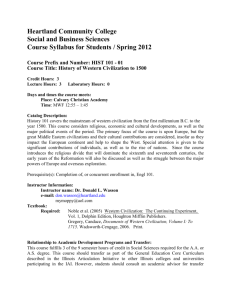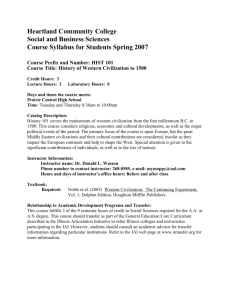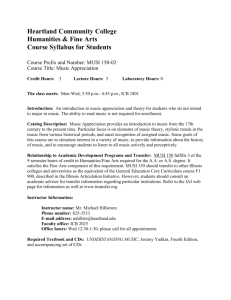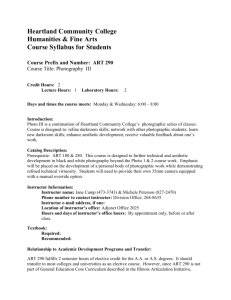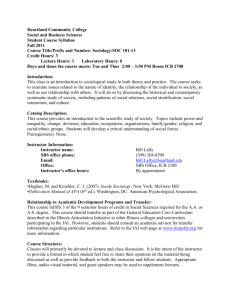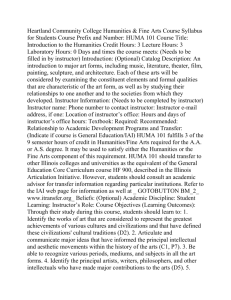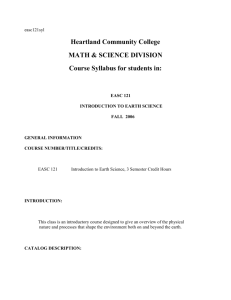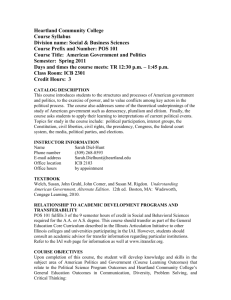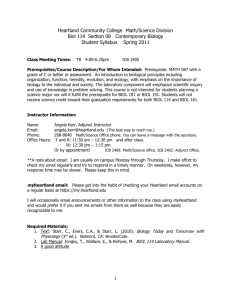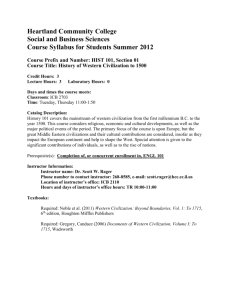HIST 136 02 RAGER SP 11 - Heartland Community College
advertisement
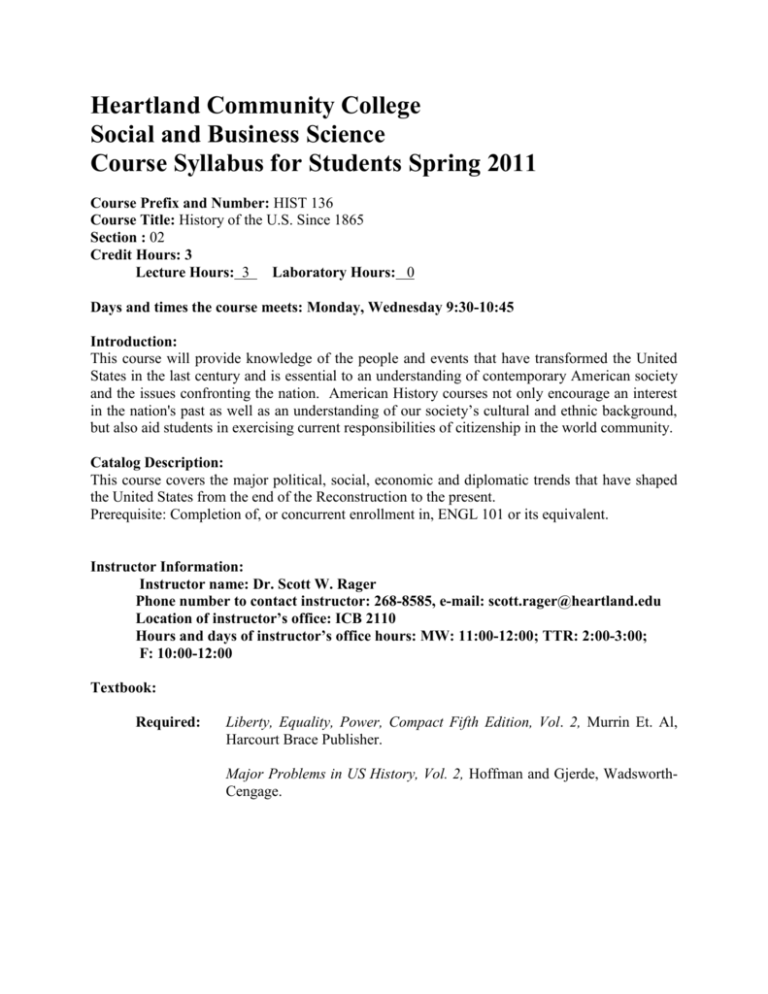
Heartland Community College Social and Business Science Course Syllabus for Students Spring 2011 Course Prefix and Number: HIST 136 Course Title: History of the U.S. Since 1865 Section : 02 Credit Hours: 3 Lecture Hours: 3 Laboratory Hours: 0 Days and times the course meets: Monday, Wednesday 9:30-10:45 Introduction: This course will provide knowledge of the people and events that have transformed the United States in the last century and is essential to an understanding of contemporary American society and the issues confronting the nation. American History courses not only encourage an interest in the nation's past as well as an understanding of our society’s cultural and ethnic background, but also aid students in exercising current responsibilities of citizenship in the world community. Catalog Description: This course covers the major political, social, economic and diplomatic trends that have shaped the United States from the end of the Reconstruction to the present. Prerequisite: Completion of, or concurrent enrollment in, ENGL 101 or its equivalent. Instructor Information: Instructor name: Dr. Scott W. Rager Phone number to contact instructor: 268-8585, e-mail: scott.rager@heartland.edu Location of instructor’s office: ICB 2110 Hours and days of instructor’s office hours: MW: 11:00-12:00; TTR: 2:00-3:00; F: 10:00-12:00 Textbook: Required: Liberty, Equality, Power, Compact Fifth Edition, Vol. 2, Murrin Et. Al, Harcourt Brace Publisher. Major Problems in US History, Vol. 2, Hoffman and Gjerde, WadsworthCengage. Relationship to Academic Development Programs and Transfer: This course fulfills 3 of the 9 semester hours of credit in Social Sciences required for the A.A. or A.S. degree. This course should transfer as part of the General Education Core Curriculum described in the Illinois Articulation Initiative to other Illinois colleges and universities participating in the IAI. However, students should consult an academic advisor for transfer information regarding particular institutions. Refer to the IAI web page at www.itransfer.org for more information. COURSE OBJECTIVES (Learning Outcomes): Learning Outcome General Education Outcomes Range of Assessment Methods Distinguish between primary and secondary sources as PS1 the foundation of modern historical scholarship from 1865 to the present. exams, quizzes, research paper, group project, other methods Interpret primary sources critically by analyzing their historical contexts. exams, quizzes, research paper, group project, other methods CT3 Formulate historical interpretations, both in discussion CO4 and in writing, and defend them critically with reference to primary and secondary sources. exams, quizzes, research paper, group project, oral report, other methods Incorporate into historical interpretations, both in CT3 discussion and in writing, an understanding of historical causation reflecting a) knowledge of important figures and events and their chronological relationship to each other and b) an awareness of the contingent relationships. Acquire at one and the same time a comprehension of DI3 diverse cultures and shared humanity, as evidenced both orally and in writing. Exams, quizzes, research paper, group project, oral report, other methods exams, quizzes, research paper, group project, oral report, other methods Topic Outline for the Course: The following topics are to be covered during the instructional process: 1. 2. 3. 4. 5. 6. 7. 8. 9. 10. 11. 12. 13. 14. 15. Reconstruction Closing of the Frontier and Western Expansion Industrialization and Its Impact Gilded Age Politics, 1876-1896 Overseas Empire and Expansionism Progressive Era, 1900-1917 World War I Jazz Age: The 1920’s The Great Depression and New Deal Isolationism to Involvement: World War II Cold War and McCarthyism Eisenhower Era, Civil Rights and the 1950’s The 1960’s: Kennedy, Johnson and Vietnam Nixon through Carter Reagan through Bush: Recent Trends Course Policies: Method of Evaluation (Tests/Exams, Grading System): 1 midterm exam 100 points 1 final exam 150 points 2 quizzes, 50 points each 2 discussion assignments, 50 points each 1 research topic proposal, 15 points 1 research progress assignment, 35 points 1 research paper, 8-10 pages, 100 points 600 Points total: 90% 600-540=A 80% 539-480=B 70% 479-420=C 60% 419-360=D Below 60% = F Attendance Students are expected to attend all classes and participate meaningfully in the activities of each class session. Attendance will be taken at every class meeting. Outstanding attendance as well as participation will impact the determination of borderline final grades. Incompletes An incomplete may be given at the instructor’s discretion, if the student, by the withdrawal date, can reasonably be expected to pass the course. Incompletes may be granted only when justified by extreme circumstances (e.g., serious illness, accident, death or serious illness in the immediate family) See College Catalog for further information. Extra-Credit: No extra credit is anticipated for this class. Make-up of Tests and Assignments: All make-ups are granted at the discretion of the instructor and will be determined according to the individual merits of the case. Students are required to contact the instructor by email or by phone within 24 hours after a quiz or an exam is missed to make arrangements for a make-up at the testing center. Failure to follow this policy will result in grade penalties. Deadlines: Assignments received late will be penalized. Please note: All students must complete a research paper in order to pass this class. Required Reading and Writing: This course requires approximately 30-40 pages of reading per session or 500 per semester. A minimum of 15 pages of college level writing is required in this course. Writing assignments include an 8-10 page research paper, essays on exams, discussion write-ups and other projects as deemed appropriate by the instructor. Specifications for written materials: Written materials will be formatted exactly as they are in English classes, ie standard MLA format. Student Conduct: Inappropriate behavior in the classroom will not be tolerated by the instructor. At all times students should endeavor to conduct themselves in an honest and mature manner. Cell phones should be turned off upon entering class. Absolutely no use of cell phones is allowed, including texting, during class time. Please also note that no food or beverages with the exception of water are allowed in the classroom. Academic Integrity Academic integrity is a fundamental principle of collegial life at Heartland Community College and is essential to the credibility of the College’s educational programs. Moreover, because grading may be competitive, students who misrepresent their academic work violate the right of their fellow students. The College, therefore, views any act of academic dishonesty as a serious offense requiring disciplinary measures, including course failure, suspension, and even expulsion from the College. In addition, an act of academic dishonesty may have unforeseen effects far beyond any officially imposed penalties. Violations of academic integrity include, but are not limited to cheating, aiding or suborning cheating or other acts of academic dishonesty, plagiarism, misrepresentation of data, falsification of academic records or documents and unauthorized access to computerized academic or administrative records or systems. Definitions of these violations may be found in the college catalog. Plagiarism Plagiarism is the presenting of others’ ideas as if they were your own. When you write a paper, create a project, do a presentation or create anything original, it is assumed that all the work, except for that which is attributed to another author or creator, is your own. Plagiarism is considered a serious academic offense and may take the following forms: 1. 2 3 4 5 6 were Copying word-for-word from another source and not giving that source credit. Paraphrasing the work of another and not giving that source credit. Adopting a particularly apt phrase as your own. Using an image or a copy of an image without crediting its source. Paraphrasing someone else’s line of thinking in the development of a topic as if it were your own. Receiving excessive help from a friend or elsewhere, or using another project as if it your own. Note that word-for-word copying is not the only form of plagiarism. [Adapted from the Modern Language Association’s MLA Handbook for Writers of Research Papers. New York: MLA, 1995: 26] Philosophy of Grades The Heartland Community College grading philosophy grows out of our vision of educational excellence. This common philosophy provides a framework for each academic division and instructor as they establish their own individual course grading system, evaluation methods, and course policies using the shared general rubrics for letter grades given below. Letter grades serve as a vehicle to promote meaningful evaluation of student achievement, to inform students of academic progress, and, as necessary, to improve student performance, habits, and practices. Using a letter grade as a prerequisite for subsequent courses means we believe that the grade was assigned through a conscious judgment about a student’s readiness to proceed to more advanced study. At Heartland, students’ academic achievement is measured by their mastery of course objectives and content. We challenge students to meet these recognized standards of achievement and we assign grades based on their success in doing so. Simply stated, we believe that the responsibility for academic achievement rests with the student and that holding students responsible for their learning promotes their academic growth. Letter Grade Rubrics “A” This grade represents consistently outstanding performance that demonstrates superior understanding and skillful use of important course concepts. Performance at this level signifies that the student is extremely well prepared to continue with more advanced study of the subject. “B” This grade represents performance significantly beyond the level necessary to achieve the course objectives. Work is of high quality but not consistently at an outstanding level. Performance at this level signifies that the student is well prepared to continue with more advanced study of the subject. “C” This grade represents an acceptable achievement of the course objectives. Performance at this level signifies that the student is reasonably well prepared to continue with more advanced study of the subject. “D” This grade represents less than adequate performance. It signifies questionable readiness to proceed with more advanced study of the subject. “F” This grade reflects unacceptable performance. The student is not yet ready to proceed with more advanced study of the subject, and must repeat the course successfully to receive credit. Student On-line Course Evaluations During the last 3 weeks of class, all students are encouraged to complete a course evaluation form online at. On-line course evaluations are completed by selecting the link in your myHeartland account. HCC Portal Just a reminder that to access WebCT, IRIS, and your Heartland Student Email, you will need to log into myHeartland, at https://my.heartland.edu. Support Services: Academic Support Services (Academic Support Center) www.hcc.cc.il.us/divisions/asc Library The Library, located in the Student Commons Buildings at the Raab Road campus, provides Heartland students with a full range of resources including books, online journal databases, videos, newspapers, periodicals, reserves, and interlibrary loan. Librarians are available to assist in locating information. For more information, please call the Library (309) 268-8200 or (309) 268-8292 Tutoring Services Heartland Community College offers tutoring in various forms at no cost to Heartland students at the Tutoring and Testing Center in Normal and at the Pontiac and Lincoln Centers. Tutors are available at convenient times throughout the week. Study groups are also available by request. For more information about services available at each location, please call the Tutoring and Testing Center in Normal (309) at 268-8231, the Pontiac Center at (815) 842-6777, or the Lincoln Center at (217) 735-1731. Open Computing Lab The Open Computing Lab provides free computing for HCC students at convenient times throughout the week. The computer lab is staffed by trained Lab Assistants and offers the use of approximately 70 computers, a scanner, a laser printer, and an electric typewriter. Disability Support Services Heartland Community College offers Disability Support Services (DSS) with offices located in the Academic Support Center. DSS ensures that students with disabilities have equal access to the college’s programs, services and activities through the provision of reasonable accommodations as outlined in Section 504 of the Rehabilitation Act and the Americans with Disabilities Act. DSS offers a wide range of services to support students with disabilities, including: assistive technology, document conversion services, personnel, classroom and testing accommodations. Students with a documented disability who wish to discuss academic accommodations can contact disability support services at (309)268-8259. Syllabi Disclaimer: Changes to the Course Calendar may be made during the course of the class. This is sometimes unavoidable and students will be notified in class should changes become necessary. Course Calendar Notice of Cancelled Class Sessions Cancelled class sessions, for all HCC classes, will be listed under Cancelled Class Meetings in the A-Z Index and under Academic Information in the Current Students page on the HCC Web site. Go to http://www.heartland.edu/classCancellations/ to learn what classes have been cancelled for that day and the upcoming week. Be sure to check the last column, which might contain a message from the instructor. Dates for class topics/reading/exams. Note: Lecture topics are in bold face type; the pages listed after each chapter are those corresponding to the lecture topic. Students are expected to read the chapters in the textbook completely. Date Topic Week 1 Jan. 10, 12 Course Introduction, Reconstruction Chapter 17 pp. 625-658 Week 2 Jan. 19 Reconstruction (cont.) Week 3 Jan. 24, 26 the New South and West Chapter 18 pp. 695-724 Research Topic Meetings with Instructor (required) Research Topic Meetings with Instructor (required) Week 4 the Industrial Age Jan. 31, Feb. 2 Chapter 19 pp. 695-724 Chapter 20 pp. 735-770 Research Topic due Feb.2 Week 5 Feb. 7, 9 the Industrial Age (cont.) Chapter 19 pp. 724-734 Week 6 Feb. 14, 16 the Farmers' Revolt Chapter 19 pp. 724-734 Week 7 Feb. 21, 23 Progressivism Chapter 21 pp. 770-808 Research Progress Reports due Feb. 23 Week 8 Feb.28, Mar. 2 Progressivism (cont.) Week 9 Mar. 14, 16 the U.S. Becomes a World Power Chapter 22 pp.809-828 Week 10 Mar. 21, 23 Progressive Foreign Policy and WWI Chapter 22 pp. 828-838 Chapter 23 pp. 839-868 Midterm Exam March 2 In order to qualify to take the Midterm Exam, a Research Progress Report must have been submitted. Draft of Research Paper due to Writing or Tutoring Services. Appointment must be completed no later than March 23. Week 11 Mar. 28, 30 the Post War Era and the 1920's Chapter 23 pp. 866-874 Chapter 24 pp. 875-918 Week 12 April 4, 6 the 1920's (cont.) the Great Depression and the New Deal Chapter 25 pp. 919-962 Research papers due April 6 Week 13 the New Deal (Cont) April. 11, 13 Week 14 April. 18, 20 1920s and 30s Foreign Policy and WWII Chapter 26 pp.963-1008 Chapter 27 pp.1009-1050 Chapter 28 pp.1051-1060, 1086-1096 Chapter 29 pp.1112-1124, 1132-1136, 1143-1148 Chapter 30 pp. 1176-1181 Week 15 April. 25, 27 Cold War, the Vietnam Era Chapter 27 pp.1009-1050 Chapter 28 pp.1051-1060, 1086-1096 Chapter 29 pp.1112-1124, 1132-1136, 1143-1148 Chapter 30 pp. 1176-1181 Week 16 May 2, 4 the Civil Rights Movement Chapter 27 pp. 1038-1042 Chapter 28 pp. 1076-1082, 1096-1099 Chapter 29 pp. 1103-1112, 1124-1129 Chapter 30 pp. 1192-1193 Recent Trends: The U.S. and the Middle East Chapter 28 pp. 1058-1059 Chapter 30 pp. 1178-1179, 1183-1185 Chapter 32 pp.1238-1240, 1244-1249, 1253-1254 Week 17 Final Exam Wednesday, May 11, 8-9:50
